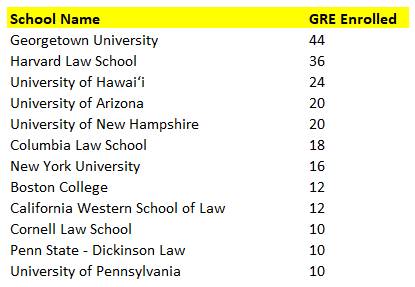It wasn’t exactly ancient history when the first law school began to accept the GRE in lieu of the traditional LSAT to consider prospective students for admission, but it wasn’t exactly yesterday either.
It was 2016. Barack Obama was president. (That’s two presidents ago.) The Summer Olympics were held in Rio. (And nobody had to wear masks.) The Chicago Cubs won the World Series (Its first since 1908.)
However, it wasn’t until recently that the American Bar Association (ABA) finally decided to recognize the Graduate Records Examination (GRE) as an acceptable option when it comes to law school admissions. Before, schools could use the GRE but had to show the test passed muster.
That’s no longer the case after the Council of the ABA Section of Legal Education and Admissions to the Bar made the call during a closed session in November.
It’s a big deal, considering that the Law School Admission Test (LSAT) had been the only other feasible option open to law schools. That test is not ancient history either, but it’s got some serious gray. It dates back to 1948, when Harry S. Truman was president.
So what happens next? That’s hard to say, apparently. Currently 70 schools — about one third of ABA-accredited law schools — accept the GRE, but the actual number of students accepted into law school via the GRE is tiny, about 1%.
One problem has been that prospective students perceive that schools prefer the LSAT, given its tradition and the ABA’s hesitancy to embrace the GRE. Now that the test is in compliance with the ABA’s admissions standards, it “may finally open the floodgates,” for its use, said Jeff Thomas, executive director of legal programs for Kaplan, the test prep company.
However, he warned that if the perceived bias against the test remains, “it’s hard to see how the GRE will truly take off.”
“Overall, we are glad the ABA has finally made a ruling on this issue, which will bring some much-needed clarity to both law schools and prospective students — keeping prospective students in limbo was particularly unfortunate,” Thomas said. “It will likely take a few admissions cycles to really measure its impact though.”
It was the University of Arizona James E. Rogers College of Law in Tucson that first accepted the GRE, thinking it would be a good way to attract more prospective students. The GRE is a verbal and math test, one that students take to get into graduate school. The LSAT is focused more on logic and critical thinking and was created for prospective law students only. You don’t take the LSAT to get an MBA.
However, the University of Arizona thought that by taking GRE students, it would help diversify the student body, particularly by attracting students who excelled in other disciplines, such as math and science. Marc Miller was and remains dean of the school. He said at the time:
“By using the GRE test, which is accepted by thousands of graduate and professional degree programs, from biochemistry to public policy to philosophy, we are able to consider qualified applicants from more diverse backgrounds.”

It turned out to be quite a controversial call, however. The Law School Admission Council (LSAC), which administers the LSAT, was not pleased with the decision and even threatened to kick the University of Arizona out of its umbrella of law schools.
The nation’s law school deans pushed back and LSAC relented. Soon, other schools — Harvard Law School being the second — began to take the GRE. So it seemed a matter of time — five years, as it turned out— before it would become an acceptable alternative.
In a statement, LSAC said it would not “second-guess” the ABA’s decision.
“The Council has been allowing law schools to accept the GRE for at least five years, and yet it still amounts to only 1% of all matriculants. We will continue to innovate to ensure that the LSAT remains the gold standard for law school admission, and we will deliver unparalleled programs and services specifically designed to attract and help diverse, talented individuals succeed.”
Meanwhile, ETS, which administers the GRE, was in a celebratory mood.
“The recent decision by the ABA to reinforce and endorse the use of the GRE in law school admissions is a testament to the value of the test in legal education,” said Alberto Acereda, associate vice president of Global Higher Education at ETS. “We look forward to continuing to bring innovation and transformation to legal education, working alongside law schools to enrich and diversify pools of future legal practitioners.
For prospective students, though, they now have a choice that may grow more vexing:
The LSAT? The GRE? Or both?
Alison Monahan, co-founder of the Law School Toolbox, said they should focus on the test that they think can do best on.
“Each test plays to different strengths, so it’s likely people will have a preference for one or the other. For example, many students hate logic games on the LSAT, but a few love them. I’d suggest people try a few of each test and see where they’re scoring, relatively speaking, and focus on preparing for the one where they’re doing best.”
And there’s one more big question: Will the ABA’s decision regarding the GRE help bring more people of color into law school? When it comes to the LSAT, Blacks and Hispanics traditionally score lower. This most recent move will not likely make a difference, says Aaron Taylor, executive director, AccessLex Center for Legal Education Excellence.
“The GRE, like the LSAT and every other widely used standardized admission test, is typified by stark racial and ethnic disparities in average test scores,” he said. “White test-takers tend to score higher than Black and Latino/a test-takers. Therefore, adoption of the GRE is unlikely to have any significant impact on racial and ethnic diversity.”
And it will not likely open the door for any other type of entrance requirement, he said. He noted how this process took a full five years, yet continues the emphasis on standardized testing.
“When it comes to diversity, the issue isn’t a lack of testing options for applicants, the issue is how the tests are used by law schools to select students and award scholarships,” he said.

